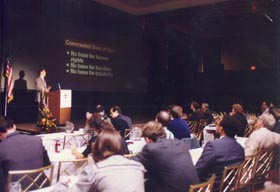
2. Ideological Education
Personalities such as the Rev. Carl McIntyre and Dr. Fred Schwartz and his Christian Anti-Communist Crusade are recognized by Richard Gid Powers for their grassroots initiatives against communism, as are the controversies which surrounded them.32 Nevertheless, these activities are dwarfed by the anticommunist activities initiated by Rev. Moon (and the controversies related to them) which Powers fails to mention. |
| Multi-media CAUSA presentation by Bill Lay. |
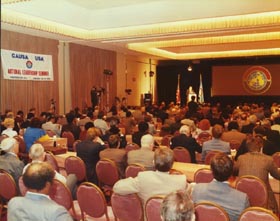 |
| CAUSA lecturers reached out to more than 250,000 leaders worldwide between 1980 and 1992. |
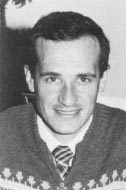 |
| Jesus Gonzalez lectured to 20,000 national and community leaders in Honduras and El Salvador between 1984 and 1990. |
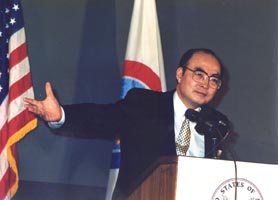 |
| Dr. Bo Hi Pak, President of CAUSA International |
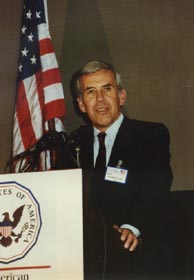 |
| Senator Richard Lugar |
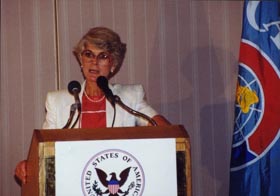 |
| Hon. Geraldine Ferraro, Democratic Candidate for Vice President of the United States in 1984 |
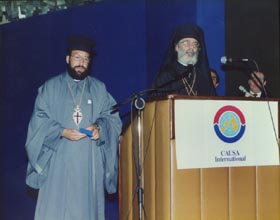
|
| CAUSA International reached out to one out of every five priests and ministers in the United States. |
In 1985 CAUSA USA decided to expand its initiative to the general public. It
launched a national signature drive, inviting Americans to sign a petition in
support of the organization's efforts to educate Americans about the dangers of
atheistic communism. Over 10 million Americans signed this petition, and these
results were reported to the White House.
American political leaders
were the focus of another organization offering VOC theory, the American
Leadership Conference (ALC), founded in 1986 under the chairmanship of Amb.
Phillip V. Sanchez, former U.S. Ambassador to Colombia and Honduras. This CAUSA
International program provided a forum where legislators could explore and
discuss international and domestic issues. However, the principal focus of the
ALC program was to educate elected officials about Soviet military strategy and
on the underlying tenets of Marxist-Leninist ideology, contrasting it with the
historical and philosophical foundations of American democracy.
Aided by
an invitational committee consisting of some 50 state legislators from
throughout the United States and an advisory board of former diplomats,
congressmen and governors, the ALC elicited a considerable response from
American political leaders. By the end of 1990, over 10,000 had attended one of
30 national, three- to four-day anticommunism conferences.
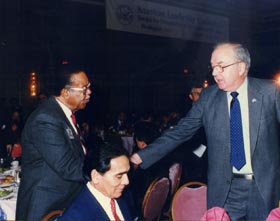 |
| Dr. Ralph Abernathy greeting Senator Jesse Helms during an ALC conference. |
Active and retired military officials were exposed to VOC theory under the aegis of the CAUSA International Military Association (CIMA). More than 800 retired high-ranking officials of the United States armed forces attended CAUSA presentations on VOC, including a sizeable number of America's retired four-star generals and full admirals.
46 A number of those officers later played crucial roles in the formation of a grassroots, activist organization founded in 1987, known as the American Freedom Coalition (AFC). With opposition to Marxist-Leninist expansionism as one of its ten founding planks, AFC drew significant media attention on the occasion of the 70th anniversary of the Bolshevik Revolution in November, 1987 when it organized rallies in all fifty states reminding Americans of the millions of men, women and children who had been senselessly eliminated in the Soviet Union, China, Cambodia and elsewhere in the name of communism.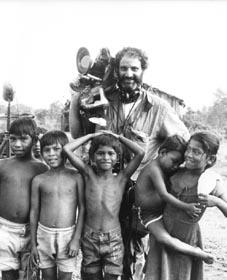
|
| Lee Shapiro, award-winning CAUSA film maker in Nicaragua. Mr. Shapiro was killed by Soviet soldiers inside Afghanistan in October, 1987. |